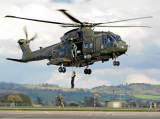
A landmark defence agreement will be signed today in London by UK Defence Secretary John Healey MP and German Defence Minister Boris Pistorius, marking a significant step for NATO and
European security. This groundbreaking deal, the first of its kind between the UK and Germany, signifies a new chapter in the nations' defence collaboration.
The "Trinity House Agreement," to be signed on Wednesday, October 23, will deepen ties between the two countries, boosting both security and economic cooperation. As part of the agreement, German aircraft will operate from Scotland, reinforcing European defence capabilities.
This landmark partnership between two of Europe’s largest defence spenders reflects a strategic shift in response to rising security threats, particularly from Russia. The agreement aims to strengthen national security and economic prosperity by fostering greater defence cooperation, investment, and job creation in both countries.
One of the major economic benefits of the agreement will be the establishment of a new artillery gun barrel factory in the UK. This facility, which will use British steel from Sheffield Forgemasters, will create over 400 jobs and contribute nearly half a billion pounds to the UK economy. It will mark the first time in a decade that the UK has produced its own artillery gun barrels.
The agreement also lays the foundation for long-term cooperation between the UK and Germany on various defence projects across all domains—air, land, sea, space, and cyber. Notably, the two countries will collaborate on the development of cutting-edge, extended-range strike weapons, including enhanced versions of the Storm Shadow missile system.
Additionally, the deal will foster closer collaboration between the nations’ defence industries, particularly in the manufacturing of Boxer armoured vehicles, supporting skilled jobs across the UK. There will also be efforts to expand complex weapons development, including work on Sting Ray torpedoes.
Key aspects of the Trinity House Agreement include:
Long-range strike weapons: Joint development of more precise, longer-range weapons.
Economic boost for the UK: A new artillery gun manufacturing facility, supporting over 400 jobs and injecting nearly £500 million into the UK economy over the next decade.
Eastern Flank cooperation: Increased joint training and exercises to strengthen NATO’s Eastern Flank.
Land-based industrial collaboration: Further cooperation on Boxer armoured vehicles and land-based drones.
Underwater infrastructure protection: Joint efforts to safeguard critical undersea cables in the North Sea, including new surveillance technologies.
German aircraft in Scotland: German P8 planes will periodically operate out of RAF Lossiemouth to help protect the North Atlantic.
Drone technology: Collaborative work on drones to support fighter jets and other military forces.
Maritime Uncrewed Air Systems: Exploration of new drone capabilities for naval operations.
Support for Ukraine: Joint projects to upgrade German Sea King helicopters with modern missile systems and enhance capabilities.
Air defence cooperation: Efforts to integrate air defence systems to better protect Europe from long-range missile threats, building on agreements from recent NATO meetings.
The signing of the Trinity House Agreement demonstrates the UK government’s commitment to strengthening ties with European allies and enhancing national security. The agreement, which comes just 100 days after the UK Defence Secretary’s visit to Berlin to initiate negotiations, also serves as the first step in a broader UK-Germany treaty, as pledged by Prime Minister Keir Starmer and Chancellor Olaf Scholz earlier this year.
Defence Secretary John Healey MP said:
"The Trinity House Agreement is a milestone moment in our relationship with Germany and a major strengthening of Europe’s security.
It secures unprecedented levels of new cooperation with the German Armed Forces and industry, bringing benefits to our shared security and prosperity, protecting our shared values and boosting our defence industrial bases.
This landmark agreement delivers on the Government’s manifesto commitment to strike a new defence relationship with Germany – less than four months since winning the election in July – and we will build on this new cooperation in the months and years ahead.
I pay tribute to our negotiating teams who have worked hard at pace to deliver this".
German Defence Minister Boris Pistorius said:
"The UK and Germany are moving closer together. With projects across the air, land, sea, and cyber domains, we will jointly increase our defence capabilities, thereby strengthening the European pillar within NATO. We can only strengthen our ability to act together. This is why our cooperation projects are open to other partners.
We must not take security in Europe for granted. Russia is waging war against Ukraine, it is increasing its weapons production immensely and has repeatedly launched hybrid attacks on our partners in Eastern Europe.
With the Trinity House Agreement, we are showing that the NATO Allies have recognised what these times require and are determined to improve their deterrence and defence capabilities. As it lays the foundation for future projects, the Trinity House Agreement is an important contribution to this. It is particularly important to me that we cooperate even more closely to strengthen NATO’s eastern flank and to close critical capability gaps, for instance in the field of long-range strike weapons".
Armin Papperger, CEO and Chairman of Rheinmetall AG commented that:
"Rheinmetall’s investment in the gun hall reflects a forward-looking approach to innovation, collaboration, and national defence. It ensures the UK remains a leader in developing and manufacturing defence technologies that safeguard both national and global security".
Gary Nutter, Chief Executive Officer at Sheffield Forgemasters, said:
"I am delighted to confirm that Sheffield Forgemasters will reinstate gun barrels manufacture after a 20-year hiatus, to supply large-calibre gun-barrels to Germany’s Rheinmetall AG, servicing UK defence contracts and exports". Photo by Ricordisamoa, Wikimedia commons.






































